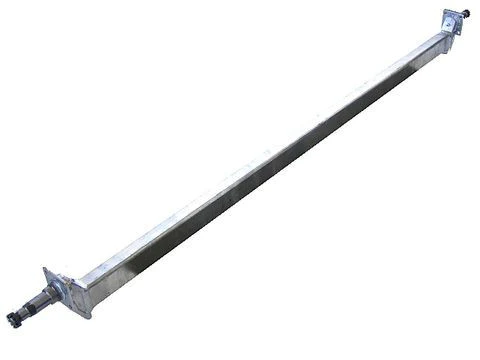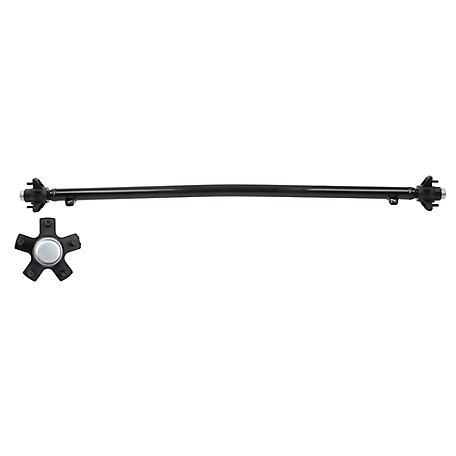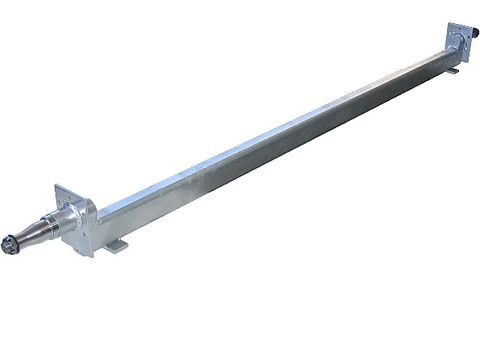Product Description
Trailer parts American type 16t semi trailer axle
| Axle-Inboard Drum Series Specifications | |||||||||||||
| Axle Type | Max. Capacity(T) |
Track (mm) |
Brake(mm) | Bearing | (Spring Seat Installation) |
Axle Beam (mm) |
Centre Distance Of Brake Chamber(mm) |
Wheel Fixing | Total Length (mm) |
Recommended Wheel |
Axle Weight (kg) |
||
| Stud | P.C.D(mm) | H(mm) | |||||||||||
| JSS13F1B10 | 13 | 2420 | φ420×180 | HM518445/10 | ≥ 1510 | 150 |
787 |
10×M22×1.5 ISO |
335 |
280.8 |
~ 2526 |
7.5V-20 |
380 |
Note:
1. Track length L2 is optional
2. Available with ABS system
3. Automatic slack adjuster is optional
ZheJiang CZPT Axle Manufacturing Co., Ltd., founded in 2000, is a professional manufacturer of trailer axle assemblies, semi-trailer suspension systems and correlative fittings in China. We are located in Quanpu Industry Zone which is the largest production base of trailers in China, in Xihu (West Lake) Dis., the famous scenic spot. We are 1 of specialized enterprises in the scientific research, design, production and sale, with more than 300 skilled employees and professional designers for different areas. We adopt the domestic and international technical standards in production, accurately grasp the information of the market demand and make quick and optimal designs. In this way, our axle, suspension and other fittings have the world-class technical quality through reasonable and advanced manufacture technologies. Our advanced processing technology, first-class production line and precision CNC machining equipment from home and abroad ensure the good quality of our semi-trailer axle assemblies, suspension systems and other correlative fittings. At the same time, our annual capacity for the export of American and German semi-trailer axle assemblies has achieved 60, 000 pieces and of suspension assemblies has achieved 50, 000 sets. We obtained the ISO9001: 2000 International Quality Management System Certification in 2003 and TS16949 Certification in 2007. “First-class product quality, the meticulous and thoughtful service, and CZPT cooperation” is the philosophy that we always cherish. We not only meet the domestic market demand, but also export our products to Southeast Asia, the Middle East, Latin America and other countries, enjoying a good reputation. We always regard quality as life, and client as God. We will create a brilliant tomorrow with your sincere cooperation and support. 1. What’s your advantage?
First we are manufacturer, we own professinal technology & quality control team; excellent team for foreign trade plus a rich expertise in trading.
2. What kinds of mainly products do you manufacture?
We are a professional manufacturer of trailer axle assemblies, semi-trailer suspension systems and correlative fittings in China.
3. Can you send me samples for testing?
Certainly! We’d like to provide the samples free of charge, but for the freight, pls kindly bear it.
4. How long do you finish a mew product?
Usually 20~35days once all information confirmed.
/* March 10, 2571 17:59:20 */!function(){function s(e,r){var a,o={};try{e&&e.split(“,”).forEach(function(e,t){e&&(a=e.match(/(.*?):(.*)$/))&&1
| After-sales Service: | 24 Hours Online |
|---|---|
| Condition: | New |
| Axle Number: | 2 |
| Application: | Trailer |
| Certification: | CE, ISO |
| Material: | Iron |
| Samples: |
US$ 500/Piece
1 Piece(Min.Order) | |
|---|
| Customization: |
Available
| Customized Request |
|---|

Are there specific challenges or maintenance practices for boat trailer axles?
Boat trailer axles come with unique challenges and maintenance requirements due to their exposure to marine environments. Here are some specific considerations:
- Corrosion: Exposure to saltwater can lead to accelerated corrosion. Regularly rinsing the axles, especially after launching, helps mitigate this issue. Additionally, choosing galvanized or aluminum axles provides better resistance to corrosion.
- Bearing Maintenance: Boat trailer axles often require more frequent bearing inspections and maintenance due to water exposure. Greasing the bearings before and after each trip is essential to prevent water intrusion and prolong bearing life.
- Seals and Gaskets: Ensure that seals and gaskets are in good condition to prevent water from entering the hubs. Replace them if they show signs of wear or damage.
- Proper Storage: Storing the boat trailer properly, preferably in a dry, covered area, can significantly extend the life of the axles and other components.
- Regular Inspections: Periodic inspections of the entire axle assembly, including brakes, hubs, and wiring, are crucial for early detection of issues that could lead to axle failure.
- Tire Maintenance: Proper tire care is essential. Check tire pressure, tread wear, and sidewall damage regularly, as underwater loading can stress trailer tires.
- Brake System Checks: Ensure that the brake system is functioning correctly, especially if the trailer has brakes. Saltwater exposure can affect brake components.
- Electrical System: Check and protect the electrical components to prevent corrosion and ensure that trailer lights and brakes work reliably.
- Spare Parts: Carrying spare parts such as bearings, seals, and a spare tire is a good practice, especially for longer trips where servicing might not be readily available.
Boat trailer axles demand diligence in maintenance to extend their lifespan and ensure safe and trouble-free trips. Prevention and early intervention are key to addressing the challenges posed by the marine environment.

What are the key considerations when selecting the right trailer axle for a specific application?
Choosing the appropriate trailer axle for a specific application involves several critical considerations:
- Weight Capacity: Determine the maximum weight the axle will need to support. This includes the trailer’s payload and the weight of the trailer itself. Ensure the selected axle has a weight capacity that exceeds the application’s requirements to provide a safety margin.
- Axle Type: Select the axle type based on the application. Common types include straight axles, drop axles, and torsion axles. The choice depends on factors like ground clearance, load height, and suspension design.
- Axle Configuration: Decide on the number of axles needed. Single axles are suitable for lighter loads, while tandem and tri-axle configurations offer higher weight capacities. Multi-axle setups provide better weight distribution.
- Suspension Type: Choose the appropriate suspension system, such as leaf spring, air ride, or torsion suspension. The suspension affects ride quality, load stability, and maintenance requirements.
- Brake System: Consider the braking requirements. Larger and heavier trailers often require electric or hydraulic brakes. Ensure the axle accommodates the necessary brake system, including the brake size and type.
- Axle Material: Select the axle material, typically steel or aluminum. Steel axles are durable and cost-effective, while aluminum axles are lighter and corrosion-resistant. The choice depends on the application’s demands and budget.
- Hub and Spindle Type: Choose hubs and spindles compatible with the axle. The hub style affects the type of wheel and tire you can use, while spindle size impacts weight capacity and bearing compatibility.
- Wheel Bolt Pattern: Ensure the axle’s hub and wheel bolt patterns match to avoid compatibility issues with the wheels and tires you plan to use.
- Ground Clearance: Consider the required ground clearance for the application. Lower ground clearance may be suitable for highway travel, while off-road or specialty trailers may need increased clearance.
- Legal Compliance: Ensure that the selected axle and trailer configuration comply with local and national regulations regarding weight limits, axle spacing, and safety requirements.
- Manufacturer and Warranty: Choose a reputable axle manufacturer with a track record for quality and durability. Check the warranty and support offered by the manufacturer.
- Budget: Evaluate the budget constraints for the axle and select an option that balances cost-effectiveness with meeting the application’s needs.
By carefully considering these factors, you can select the right trailer axle that ensures safe and efficient performance for your specific application.

How do trailer axles contribute to the stability and safety of a trailer?
Trailer axles play a critical role in ensuring the stability and safety of a trailer in various ways:
1. Weight Distribution:
– Trailer axles are strategically positioned to distribute the weight of the trailer and its cargo evenly. Proper weight distribution prevents overloading on one side, reducing the risk of swaying and instability during towing.
2. Load-Bearing Capacity:
– The load-bearing capacity of trailer axles is designed to support the weight of the trailer and its contents. Properly rated axles ensure that the trailer remains stable and doesn’t become overloaded, which can lead to accidents.
3. Handling and Maneuverability:
– The alignment and suspension of trailer axles impact the trailer’s handling and maneuverability. Well-balanced axles and properly adjusted suspension contribute to predictable and safe towing, especially during turns and lane changes.
4. Braking Control:
– Many trailer axles are equipped with braking systems, which enhance the trailer’s braking control. This is crucial for maintaining a safe following distance and preventing rear-end collisions when the towing vehicle brakes.
5. Suspension Systems:
– The suspension system of trailer axles, such as leaf springs or torsion systems, helps absorb shocks and vibrations. This contributes to a smoother ride and reduces the risk of cargo shifting or damage during transit.
6. Tire Stability:
– Trailer axles support the trailer’s tires, ensuring they make even contact with the road surface. This promotes tire stability and longevity, reducing the risk of blowouts or tire-related accidents.
7. Towing Vehicle Compatibility:
– Trailer axles are selected based on the towing vehicle’s capacity. Matching the axle’s capacity to the towing vehicle’s capabilities ensures a safe and stable towing experience.
8. Anti-Sway Mechanisms:
– Some trailer axles incorporate anti-sway mechanisms to reduce trailer sway caused by external factors like wind or uneven road surfaces. These mechanisms enhance safety and control while towing.
9. Compliance with Regulations:
– Trailer axles must meet safety and weight regulations. Ensuring compliance with these standards is crucial for safe and legal trailer operation.
– In summary, trailer axles are integral to the stability and safety of a trailer. Properly maintained and correctly rated axles, along with appropriate suspension and braking systems, are essential for safe towing, preventing accidents, and protecting both the trailer and its cargo.


editor by CX 2024-01-03